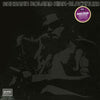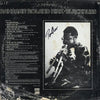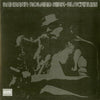





Rahsaan Roland Kirk - Blacknuss
ORDER LIMITED TO ONE ITEM PER CUSTOMER
Rahsaan Roland Kirk - flute, tenor saxophone [click here to see more vinyl featuring Roland Kirk]
Whistle, Gong, saxophone, vocals, arrangements), Henry Pearson (bass), Bill Salter (bass, Congas), Richard Landrum & Arthur Jenkins (Congas,Cabassa), Bernard Purdie (drums), Khalil Mhdri (drums), Billy Butler (guitar), Cornell Dupree (drums), Keith Loving (drums), Mickey Turner (organ), Joe Habad Texidor (percussion), Richard Tee (piano), Sonelius Smith (piano), Dick Griffin (trombone), Charles McGee (trumpet), Mickey tucker (organ)
Written by Bill Withers (A1), Al Cleveland (A2a), Marvin Gaye (A2a, A2b), Renaldo Benson (A2), Chris Allen (A3), Johnny Cameron (A3), Johnny Bristol (A4), LaVerne Ware (A4), Pam Sawyer (A4), Ronald White (A5), William Robinson (A5), Rahsaan Roland Kirk (A6, B4), Princess Patience Burton (A7), Clifton Davis (B1), David Gates (B3). B2 is traditionnal.
1 LP, standard sleeve
Limited edition
Original analog Master tape : YES
Heavy Press : 180g
Record color : black
Speed : 33 RPM
Size : 12'’
Stereo
Studio
Record Press : Unspecified
Label : Pure Pleasure Records
Original Label : Atlantic
Recording : Atlantic Studio, New York City on August 31 and September 8, 1971
Producer : Joel Dorn
Originally released in 1972
Re-mastering by: Ray Staff at Air Mastering, Lyndhurst Hall, London
Reissued in 2020
Tracks :
Side 1:
Side 2:
Reviews :
“Rahsaan Roland Kirk was a unique figure in jazz lore. As a teenager, the blind musician was performing in Ohio as part of the burgeoning r & b scene. His ability as a multi-instrumentalist was enhanced by his uncanny ability to play more than one saxophone…simultaneously! Active in recording from 1955 to his premature death in 1977, Kirk began as a hard bop jazz performer, and became an early proponent of soul jazz. His musical aesthetics drew on global influences, as well as classical and popular material. From the beginning, he embraced the socio-political themes consistent with his era. The apex of his career was the 11-year (1965-1976) stint with Atlantic Records that produced 12 notable releases. In addition to saxophone, Kirk excelled at flute. His unusual technique combined elements of humming and nose breathing. Additionally, he introduced a variety of experimental sounds (alarm clocks, bells) into his dizzying musical tapestries. His influence transcended jazz, inspiring rock musicians like Jimi Hendrix and Ian Anderson.
Pure Pleasure Records has released a re-mastered 180-gram vinyl of Blacknuss. Side 1 is a musical vision that merges jazz with soul funk in concise parameters. The opening track, “Ain’t No Sunshine When She’s Gone” is incandescent with a flute accompanied by abstract vocals (both Kirk). The funk is delivered with vibrant congas (Richard Landrum), thumping bass (Henry Pearson) and guitar (Billy Butler). Like much of Kirk’s work, it is breathtakingly fresh. The wild ride is just beginning as a supercharged Kirk tenor reinvent’s Marvin Gaye’s melancholic, “What’s Goin’ On”. This version soars with hard-driving energy, swirling with accents on trombone (Dick Griffin), trumpet (Charles McGhee), whistles and organ (Mickey Tucker). The second movement (“Mercy, Mercy Me/The Ecology”) is equally transformed into a sultry jazz ballad with bluesy resonance and chord changes. In what feels like a second two-song medley, “Take Me Girl, I’m Ready” and the Isley Brothers gem, “I Love You, Yes I Do” are executed with tight arrangements and muscular structure. This allows Kirk to improvise freely. “My Girl” is coyly funky, and jazzed up considerably with nimble guitar licks, freewheeling flute and relentless energy. The veteran saxophonist is not restricted by genre or unwritten protocols. An original composition, “Which Way Is It Going” is a tour-de-force of flute expression. Kirk plays with abandon (even shrillness) to ignite a high-energy blues scoot. His idiosyncratic vocals add depth and abstraction to the number. The internalization of society and culturally advanced vision is captured on “One Nation”. The music landscape is frenetic with Afro-Cuban motifs. There is an interesting call and response with a striking vocalist who matches the grittiness of the song. The 7 tracks on this side are captivating and render the listener breathless.
Side 2 continues the early 70’s jazz soul attitudes. On “Never Can Say Goodbye” (previously covered in soul veneer by Isaac Hayes), Kirk instills a Latin-infused, horn/reed-driven engine to drive the re-purposed pop sensibility. His runs are searing, at times harsh. He maintains a jazz edginess. There are several highlights on this album, perhaps none more than “Old Rugged Cross”. This is a straight up gospel sermon, replete with Kirk’s vocal litany of cross-related imagery. A Sunday-morning organ (Mickey Turner) and piano (Richard Tee) set the backdrop for Kirk’s lower-register saxophone lead. The raw feeling is palpable. With a spirited tempo shift (aided byCornell Dupree on guitar), the expanded ensemble swells with crescendo after crescendo. Kirk’s double sax play is inspiring. In an unexpected selection, David Gates’ “Make It With You” morphs into a “down ’n’ dirty” Memphis hook-driven instrumental. Kirk stretches the tonal boundaries of his saxophone as electric piano (Richard Tee) and distorted electric guitars (Cornell Dupree and Keith Loving) set the mood. In a deserved finale, the title track is another “testimony”. Kirk verbally intones “b-l-a-c-k-n-u-s-s” as the atmospheric jam explodes into African rhythms. Kirk adds a caressing, soulful sax line at the end before the repeat chant.
Blacknuss was a trend-setting iconic contribution to jazz. Rahsaan Roland Kirk’s creative force helped to define musical culture. This re-mastering is excellent. The stereo separation is top-notch and the overall mix is balanced.” Robbie Gerson, Audiophile Audition, May 2020
"While the entire album shines like a big black sun, the other standouts include a deeply moving read of 'My Girl' and a version of 'The Old Rugged Cross' that takes it back forever from those white fundamentalists who took all the blood and sweat from its grain and replaced them with cheap tin and collection plates. On Kirk's version, grace doesn't come cheap, though you can certainly be a poor person to receive it. Ladies and gents, Blacknuss is as deep as a soul record can be and as hot as a jazz record has any right to call itself. A work of sheer blacknuss!" - AllMusic
From its opening bars, with Bill Salter's bass and Rahsaan's flute passionately playing Bill Withers' "Ain't No Sunshine", you know this isn't an ordinary Kirk album (were any of them?). As the string section, electric piano, percussion, and Cornel Dupree's guitar slip in the back door, one can feel the deep soul groove Kirk is bringing to the jazz fore here. As the tune fades just two and a half minutes later, the scream of Kirk's tenor comes wailing through the intro of Marvin Gaye's "What's Goin' On", with a funk backdrop and no wink in the corner -- he's serious. With Richard Tee's drums kicking it, the strings developing into a wall of tension in the backing mix, and Charles McGhee's trumpet hurling the long line back at Kirk, all bets are off -- especially when they medley the mother into "Mercy Mercy Me". By the time they reach the end of the Isleys' "I Love You, Yes I Do", with the whistles, gongs, shouting, soul crooning, deep groove hustling, and greasy funk dripping from every sweet-assed note, the record could be over because the world has already turned over and surrendered -- and the album is only ten minutes old!
"Blacknuss", like "The Inflated Tear", "Volunteered Slavery", "Rip, Rig And Panic", and "I Talk To The Spirits", is Kirk at his most visionary. He took the pop out of pop and made it Great Black Music. He took the jazz world down a peg to make it feel its roots in the people's music, and consequently made great jazz from pop tunes in the same way his forbears did with Broadway show tunes. While the entire album shines like a big black sun, the other standouts include a deeply moving read of "My Girl" and a version of "The Old Rugged Cross" that takes it back forever from those white fundamentalists who took all the blood and sweat from its grain and replaced them with cheap tin and collection plates. On Kirk's version, grace doesn't come cheap, though you can certainly be a poor person to receive it. Ladies and gents, "Blacknuss" is as deep as a soul record can be and as hot as a jazz record has any right to call itself. A work of sheer blacknuss!
Ratings :
AllMusic : 4 / 5 ; Discogs : 4.35 / 5 ; Audiophile Audition : 4.5 / 5



